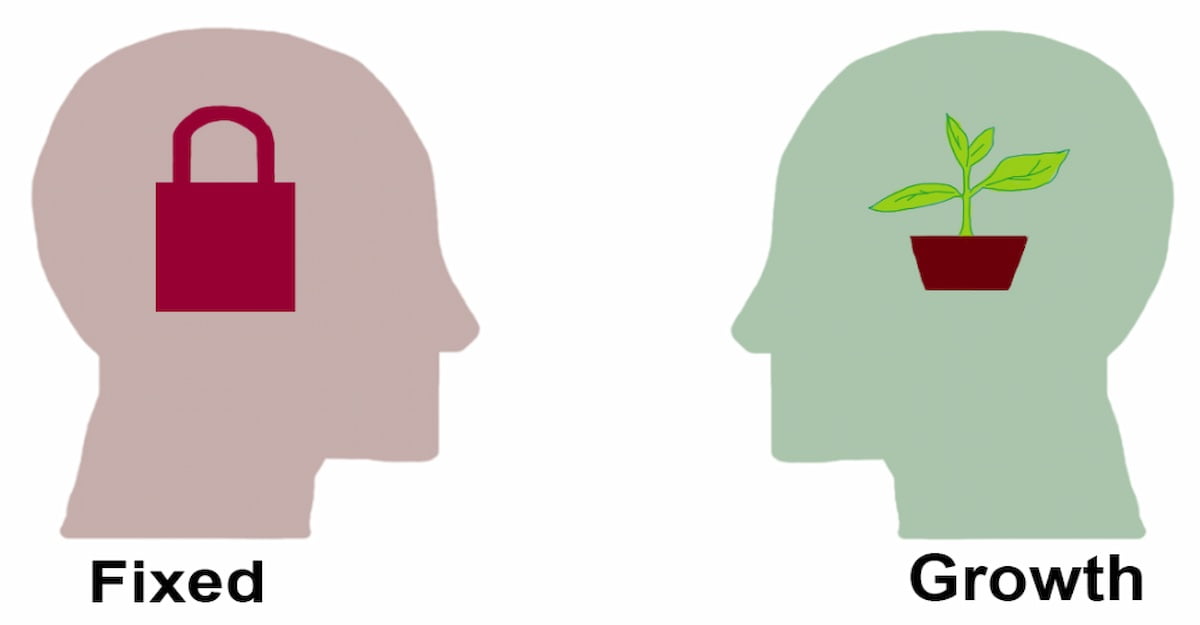Students are often encouraged to aim for straight A’s, pursue the highest grades, and seek perfection in every academic endeavor. While academic excellence is undoubtedly essential, it’s important not to overlook something equally important, if not more so—the journey of growth.
Consider a scenario: A student, John, sits in his room, wrestling with a complex science project. Initially, frustration and self-doubt may creep in as he struggles to grasp the subject matter. However, John possesses a remarkable mindset—a growth mindset. He understands that excellence is not solely about the final grade but also about the process of learning, failing, and improving.
In this article, we’ll dive into the foundations of a growth mindset, distinguish it from its counterpart, the fixed mindset, and emphasize why it holds a sacred place in the heart of Christian education.
So, join us as we dive into how fostering a growth mindset isn’t just about acing exams; it’s also about aligning with Christian values, encouraging continuous spiritual and personal development, and enjoying the ride as we learn and grow together.
What is a Growth Mindset for Learning?
American Psychologist, Carol Dweck, introduced the concept of a growth mindset, and it has since become a foundational principle in the world of education. Simply put, having a growth mindset means embracing the idea that our abilities and intelligence are not set in stone. It’s about recognizing that effort is the path to improvement and that with persistence, we can achieve greater heights than we ever thought possible.
Dweck’s groundbreaking research has shown that individuals with a growth mindset are more likely to take on challenges, persevere through difficulties, and ultimately reach higher levels of achievement in both academics and life pursuits. This transformative mindset is not only applicable to education but also resonates deeply with the Christian belief in the potential for continual spiritual and personal growth, making it an invaluable concept in the context of Christian education.
As evidence, you can also find the concept of a growth mindset in the Bible that mirrors the significance of a growth mindset. Proverbs 24:16, for instance, beautifully encapsulates the idea of resilience and continuous growth. It states, “For though the righteous fall seven times, they rise again.” This verse serves as a reminder that setbacks and failures are not the end but merely stepping stones to growth and improvement.
Read more: Fun and Easy Critical Thinking Activities for 5-Year-Olds
Growth Mindset vs. Fixed Mindset: What is The Difference?

In educational psychology, mindset plays a key role in understanding how individuals approach learning and challenges. A fixed mindset is the belief that intelligence and abilities are static and cannot change, while a growth mindset is based on the idea that people can improve through effort, learning, and perseverance.
These contrasting views—referred to as fixed or growth mindset—are shaped by one’s personal characteristics and life experiences. People with fixed mindset beliefs tend to avoid challenges, fear failure, and view effort as pointless, whereas those who hold growth mindset beliefs see obstacles as opportunities to learn and grow.
Growth Mindset
A growth mindset encourages students to believe that their intellectual ability is not fixed but can be developed through effective learning strategies, consistent effort, and constructive feedback. Students with this mindset are more likely to engage in continuous learning, reflect on their own mistakes, and take responsibility for their progress.
Mindset interventions are often used to help students develop a growth mindset, especially during academic struggles. They reshape students’ beliefs about failure and success, leading to improved academic outcomes and a stronger sense of motivation.
Fixed Mindset
A fixed mindset is characterized by the belief that a person’s intellectual ability is unchangeable, which can limit academic growth and potential. Students with fixed mindset thoughts often interpret setbacks as permanent failures rather than as opportunities to improve. They may avoid challenges, give up easily, and feel discouraged by the success of others, leading to poor students’ perceptions of their own capabilities.
Without proper encouragement, such students may view academic struggle as a threat to their self-worth. To address this, teachers can encourage students by creating safe environments for risk-taking and failure, using mindset interventions to help reframe their students’ beliefs about ability. Shifting away from a fixed mindset is essential to helping learners stay engaged and open to feedback that promotes growth.
The Importance of Growth Mindset for Learners
In a compelling Ted Talk, Carol Dweck—renowned psychologist and author of Mindset, published by Random House—shared an inspiring story about a high school in Chicago where students had to pass a specific number of classes to graduate. Instead of giving students a “Fail” grade when they didn’t meet the required mark, they used the phrase “Not Yet.” This simple yet powerful shift in language is rooted in the science of implicit beliefs—the underlying assumptions students hold about their abilities. “Not Yet” signals to students that growth requires time, effort, and effective strategies, rather than innate ability or a fixed trait.
When students see a failing grade, it often feels like a dead end. It can reinforce the idea that they’re “not smart enough”—a hallmark of the fixed mindset. But “Not Yet” helps students understand that learning is a process. They’re not failing; they’re progressing. This shift encourages a growth mindset, helping students see challenges and setbacks not as threats, but as opportunities to improve through increased effort, problem-solving, and self-regulation.
Small changes like this can normalize struggle, showing that it’s a natural and even necessary part of learning. By helping students reframe difficulty as part of the journey, teachers can encourage a growth mindset that leads to better performance and a stronger belief in their own potential. Instead of giving up, students are more likely to put in more effort, try new skills, and seek effective strategies for success.
This message is not just motivational; it’s supported by long-term research in educational and experimental psychology, which shows that students who believe their abilities can grow through hard work and persistence tend to be more resilient, perform better, and are more likely to thrive in the long run.
In the world of education, embracing different mindsets can be truly transformative. Whether in math class or public speaking, a growth mindset equips students with the courage to try, fail, and try again—because they know that success is not about perfection but about progress.
At SPH, this approach aligns beautifully with our vision of Christian education, which emphasizes continuous learning, faith, and perseverance. Our goal is to build not only academically capable students but also spiritually grounded individuals. Helping students grow holistically is part of nurturing them into individuals who contribute meaningfully to their communities and to God’s Kingdom.
As Ephesians 4:16 reminds us, “From him, the whole body, joined and held together by every supporting ligament, grows and builds itself up in love, as each part does its work.” Just as each student contributes uniquely to the classroom and community, so too does every small act of encouragement help shape a mindset of growth, faith, and lifelong learning.
Read more: Emotional Intelligence in School: Diving into IQ vs. EQ
Can a Growth Mindset Be Cultivated?
Definitely! A growth mindset isn’t something we’re born with; it’s a way of thinking that can be developed and nurtured over time. Cultivating a growth mindset involves shifting from a fixed mindset—where abilities are seen as static—to a perspective focused on continuous improvement and growth.
To help your child adopt a growth mindset, start by encouraging a new way of looking at challenges, effort, and feedback. Teach them that abilities and intelligence are not fixed but can grow through hard work and persistence.
Emphasize the importance of seeing learning opportunities in every situation, understanding that mistakes are part of progress, and believing in their ability to improve. Encourage them to set goals that focus on improvement rather than perfection, as goal-setting helps them break down their learning journey into manageable steps that encourage growth.
A fixed and growth mindset often manifests in different behaviors. For example, a child with a fixed mindset may avoid challenges or feel defeated by failure, whereas a child embracing a growth mindset will view difficulties as valuable lessons and opportunities for growth. Recognizing these tendencies in your child’s responses is key to guiding them toward a more positive, growth-oriented perspective.
Creating a supportive learning environment is also crucial. By celebrating effort and resilience over immediate results, children learn to value the process of learning rather than simply the outcomes.
This supportive, growth-focused environment encourages them to believe in their potential and remain committed to their learning and development. Embracing a growth mindset means encouraging an atmosphere where every student can flourish, seeing each challenge as an opportunity for growth.
13 Ways to Cultivate a Growth Mindset for Your Child

So, you’re now ready to embrace the concept of a growth mindset for your child. You have seen its potential and the positive changes it can bring, and you’re eager about the new opportunities it can create. Next, it’s time for you to cultivate its growth in your child. Here are some practical tips that you can do to cultivate a growth mindset:
1. Encourage Them to Reflect on Progress
Help your child recognize their growth by reflecting on areas they’ve improved over time, emphasizing the effort and learning strategies that made it possible. Encouraging journaling as a tool to track challenges, solutions, and progress allows them to see firsthand how persistence leads to development. This helps them understand that learning is a journey focused on growth rather than a fixed outcome.
Read more: Effective Self-Management Skills for Students
2. Seek Inspiration from the Success of Others
Share stories of inspirational figures, including Jesus Christ, who achieved success despite challenges to show that resilience and faith can lead to triumph. By learning from others’ journeys, your child can see that success often requires perseverance and that growth mindset theory acknowledges setbacks as integral parts of growth. This teaches them that a growth mindset is one in which challenges are learning opportunities, contrasting with a fixed mindset focused only on results.
3. Teach Them to Embrace Feedback
Encourage your child to seek feedback. Proverbs 15:31 says, “Whoever heeds life-giving correction will be at home among the wise.” This feedback allows for setting new goals and teaches students to view correction as constructive rather than critical. By teaching students the value of feedback, you’re helping them adopt a mindset focused on learning and growth, which is in line with a growth mindset approach.
4. Help Them to Embrace the Power of “Yet”
Introduce “yet” into their vocabulary to reframe obstacles. When your child feels like they can’t do something, remind them that they haven’t mastered it “yet.” This simple shift shows that growth and fixed mindsets can coexist, with growth focused on the journey and potential rather than fixed abilities. This helps them see that skills develop with time and effort.
5. Explore New Learning Opportunities
Encourage your child to step outside their comfort zone by trying new activities, inspired by Philippians 4:13: “I can do all things through Christ who strengthens me.” Stepping into new experiences nurtures an openness to growth and is essential in a growth mindset in education, where students embrace the opportunity to learn new skills and grow continually.
Read more: The Skills Beyond the Grades
6. Don’t Be Afraid of Failures
Teach your child that failure isn’t a dead end but a stepping stone. The growth mindset theory emphasizes that mistakes can be valuable lessons. When they encounter setbacks, help them analyze what went wrong and identify improvements for next time. Embracing failures as learning tools encourages resilience and the idea that growth requires a constructive approach to overcoming challenges.
7. Encourage Effort Over Results
Encourage your child to focus on the effort they put into learning rather than just the outcome. By valuing effort, they see that improvement and success come through perseverance. Using phrases like, “I love how hard you worked on that!” reinforces the growth mindset, helping them understand that effort is the key to learning and growth. This mindset contrasts with a fixed mindset, where abilities are seen as static.
8. Embrace Mistakes as Learning Opportunities
Help your child view mistakes as valuable learning moments rather than failures. By analyzing mistakes together and identifying how to improve, they learn problem-solving skills. This mindset empowers them to see setbacks as natural and constructive parts of their learning journey, fostering resilience and the view that growth requires learning from every experience.
9. Model a Growth Mindset Yourself
Children learn significantly by observing adults. Demonstrate a growth mindset by openly sharing your challenges and learning processes, showing them that a growth mindset requires patience and effort. By modeling resilience and positive reactions to setbacks, you encourage a growth mindset in students and highlight that life’s obstacles are opportunities for growth.
10. Set Achievable, Incremental Goals
Help your child set realistic, incremental goals to ensure they experience progress without feeling overwhelmed. Each small accomplishment builds confidence and motivates them to tackle more. This strategy aligns with the growth mindset approach by teaching them that growth happens one step at a time. It’s a reminder that progress is a journey, contrasting with a fixed mindset that views ability as static.
11. Encourage Curiosity and Ask Open-Ended Questions
Support your child’s curiosity by encouraging questions and exploring ideas together. Ask questions like, “What do you think would happen if…?” to stimulate critical thinking. Cultivating curiosity fosters a mindset focused on learning and growth, encouraging them to see learning as an exciting, ongoing process rather than a series of correct answers.
12. Celebrate Resilience and Perseverance
Recognize and celebrate your child’s perseverance, especially when facing difficult tasks. Highlighting resilience reinforces that challenges are a vital part of the learning process, allowing them to see how persistence is linked to growth. By celebrating these qualities, you encourage a growth mindset in students, showing them that determination and hard work are valuable.
13. Introduce Them to Growth-Focused Stories and Role Models
Share stories of people who have overcome obstacles through dedication and hard work. Real-life examples illustrate how a growth mindset approach encourages individuals to push through setbacks and keep learning. These stories provide powerful learning strategies and role models, inspiring your child with a mindset approach focused on resilience, persistence, and continuous achievement.
Conclusion
In a world that often prioritizes perfect grades and unyielding standards, we must remember the beauty of the learning journey. A growth mindset values the learning process over final grades. In this article, we explored this transformative mindset, contrasted it with the fixed mindset, and highlighted its significance.
Central to this philosophy is the belief that our potential is ever-evolving, echoing biblical teachings. Proverbs 24:16 reminds us that even the righteous stumble but rise again, embodying resilience and ongoing growth.
As parents and educators, we have the power to instill this mindset in our children, aligning with Christian teachings about nurturing the spirit and the mind. It guides our children toward facing life’s challenges with courage and viewing setbacks as opportunities.
One practical way to nurture this growth mindset is by choosing a Christian school that embodies these principles in its approach to education. International schools like SPH provide a caring teaching and learning support team that values growth more than ever. In such an environment, students not only receive academic instruction but also they can gain valuable insights into personal and spiritual growth.
By selecting such a school, we can ensure that our children are equipped with the tools and values necessary to embrace a lifelong journey of continuous improvement.
Explore how SPH’s holistic teaching provides the perfect setting for learners to cultivate a growth mindset and even beyond. Discover how our approach fosters both academic and spiritual development and how it can benefit your child’s growth and transformation.









